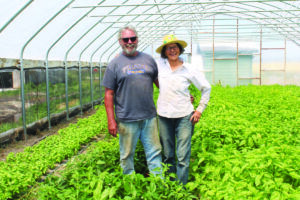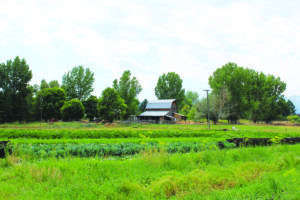
by Michael Howell
Luci Brieger and Steve Elliot, owners of Lifeline Produce, a certified organic farm that has been feeding communities in the Bitterroot and Missoula Valleys since 1979, have been selected to receive the 2024 Lifetime Conservation Award by the Missoula Conservation Roundtable. The Missoula Conservation Roundtable is an informally organized group of people, all of whom have made important contributions to natural resource conservation in the Missoula and surrounding area. Each year the group selects outstanding individuals to receive awards recognizing their achievements. Awardees become Roundtable members and join in the tradition of annual recognition. The handful of persons who started the Roundtable has now grown to over a hundred.
Brieger and Elliot met at Lifeline Produce, a collectively owned organic farm near Victor, about 40 years ago. Brieger, working as an apprentice at the time, said she found the work “ethically pleasing.” Elliot, who was working in construction, said he wanted to do something ethical with his life, and was looking for work that was more “worthwhile” than hanging wallpaper for a living. Based on this shared interest, the two formed a bond that not only produced tons of organic vegetables over the years but also three now-grown children who, by chance, were all back working on the farm this summer.
Lifeline Produce operated on leased land in the beginning but found a place of its own in 1992 when it purchased 20 acres near Victor. Another 21 acres was acquired from neighbors over the years and about 11 years ago another 38 acres south of Stevensville was purchased, bringing the total to about 79 acres.
As Missoula Conservation Roundtable members Neva Hassanein and Vicki Watson put it in their notice of the award, “Conservation can be understood as learning to work with the land, using it respectfully, and passing it on in good shape to the next generation. By embracing ecological diversity and reciprocity, Lifeline exemplifies conservation at its finest. They brew biodiesel for their trucks and tractors with used cooking oil from local restaurants. They capture solar power for their coolers, pumps, and home. They divide their farm into vegetable production land, hay ground, and perennial pasture, rotating these and using composted livestock manure to build soil health and close the nutrient cycle. They work with the land to provide a diversity of habitats, and the resulting biodiversity provides some natural pest control and disease suppression AND the music of birds and bees! Each piece of this land organism plays its biological and economical role, working to support the life of the whole. In this organism, Steve and Luci are the mind and the will, guiding the living system.”
Elliot said that creating a self-sufficient “closed loop” system like they have today was a goal from the very beginning. But it was a long slow process. According to him, the goal wasn’t essentially reached until about three years ago when they had finally grown their herd of cows and flocks of sheep to full capacity. It’s the cows and sheep that produce the manure used to make the compost to grow the vegetables and the hay used to feed the animals that makes it all possible.
This “closed loop” is a lot more involved and complex than you might imagine. It involves using solar power to produce the electricity they need for things such as water pumps and refrigerators. It means trading vegetables for used restaurant oil to produce the biodiesel to run their tractors. They currently produce about 24 kilowatts of solar power and produce about 2,000 gallons annually of biodiesel fuel.

Besides the complexity involved in growing the hay, raising the animals, and producing the compost, just growing the vegetables alone is fraught with its own complexities. It’s not enough to just grow cabbage, lettuce, chard, kale, parsley, cilantro, basil, chives, mint and other herbs. These light, leafy crops bring in revenue only in the summer.
“We only grow it if we are pretty sure we can sell it,” said Brieger. But when winter puts an end to this leafy produce, it leaves nothing more to sell. So some of the land has to be swapped out for produce that can keep and provide for fall and winter work, like potatoes, carrots, beets, and onions. Raising bedding plants for sale is a spring operation.
“Having something for sale through the whole calendar year is an essential part of our business model,” said Brieger.
When growing the leafy plants in summer, timing is also a factor. Leafy produce quickly matures but doesn’t last and must be sold when it is ready. Lettuce, for instance, is planted 12 times over the course of the season. Cilantro is planted 15 times, basil six to eight times.
On top of all this there are other things to be considered, such as pests and disease. This involves everything from rotating crops to keep the soil healthy and disease resistant to placing sonar devices to drive off pests. They also intentionally plant some wildflowers just to attract pollinators.
Brieger said, all things considered, having as much diversity in crops and habitat is the best plan and they have worked hard at it over the years. The result is a farm with ponds, marsh, woodlands, open grass land, crops, both irrigated and unirrigated land. All of it hosting lots of birds and beneficial insects with no huge pest problems or any serious disease problems.
Besides their work on the farm, Elliott and Brieger have also been supporters and leaders of many organizations in Montana’s vibrant local food and sustainable agriculture movement. They helped create some of Montana’s first organic standards by helping form the Montana Sustainable Growers Union and creating the farmer-verified “Homegrown” label. Steve and Luci were also early and ongoing supporters of Garden City Harvest and the PEAS farm. Lifeline is a member of Western Montana Growers Cooperative, a nationally recognized, successful business run by and for its member-farmers. Lifeline Produce has been a showcase and inspiration for others, frequently hosting field days and tours for the interested public, drawing farmers and eaters from across the state.
Honoring the past and the future, they created the Lifeline Food Sovereignty Scholarship at UM to support Indigenous students interested in food sovereignty.
To top it off, working with the Bitterroot Land Trust, the couple has placed their land under a conservation easement to ensure that it will not be developed in the future and removed from agricultural production.
“This is our life’s work,” Brieger told the Bitterroot Star. “Over the years we have been able to buy these 79 acres and rebuild healthy soils. We raised our three children here, and our family agreed we wanted this ground to be available for organic agriculture for generations to come. We knew that a conservation easement would probably be a useful tool to make that happen.”
They have done it all without seeking or expecting any accolades. “We just kept our heads down and kept moving,” said Elliot.
“But it does feel wonderful actually to be recognized like this,” said Brieger. “It’s not the Nobel Prize, but for me it might as well be. It’s great.”
Star Jameson says
They deserve this honor. I’ve counted on their vegetables and other organic farms have learned from them for decades